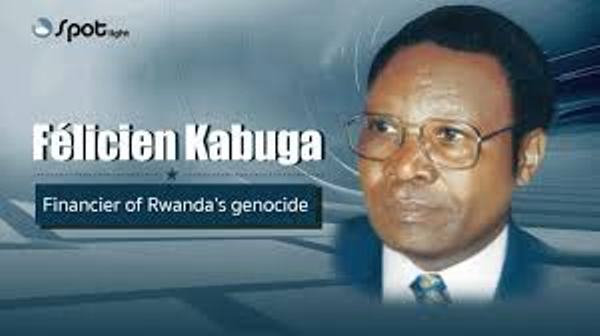
Kigali: On Wednesday, June 3rd , 2020, the investigative chamber of the Paris Court of Appeal issued a ruling authorizing the referral of Félicien Kabuga, accused of crimes related to the genocide of Tutsis committed in Rwanda in 1994, to the International Residual Mechanism for the International Criminal Tribunals (IRMICT), a structure instituted by the UN security council to complete the work of the two international ad hoc tribunals: the International Criminal Tribunal for the former Yugoslavia “ICTY” and the International Criminal Tribunal for Rwanda “ICTR”.
After his arrest at Asnières-sur-Seine, in the Paris region, it was a question for French justice to rule on the validity of the arrest warrant issued by the International Criminal Tribunal for Rwanda, on whether or not to keep the accused in detention, as well as on his transfer to the UN
Mechanism.
At the hearing of May 20th, Kabuga and his defense requested the French court to release the accused, on grounds that, there was no risk of alteration of the evidence, pressure on the witnesses or disturbance to public order, they also invoked the advanced age of the accused, his health condition, as well as a guarantee for representation. The prosecution, on its part, pleaded for continued detention, recalling that Kabuga had managed to run away from justice for 25 years, and arguing that his release posed a risk of escaping again and entailed an obvious risk to public order. The Attorney General also stressed that, so long as Kabuga was detained in the Prison de la Santé, which offers the necessary guarantees, there was no need to worry about his health.
On the question of the referral, the defense had advanced reasons relating to the fact that the arrest warrant issued by the United Nations court was not drafted in the language the accused understands and they also cast a doubt on the health care system in Tanzania, which, according to the defense, does not offer guarantees for the accused, in view of his health condition and advanced age. Kabuga and his defense had assiduously pushed for the trial before French courts, emphasizing that, the referral to the IRMICT, would make of the case a political trial and deprive the accused of a fair trial. The defense had also questioned the principle of primacy of the United Nations Mechanism over national courts.
At the hearing of May 20th, the application for a release order was rejected on the grounds of “insufficient representation and risk of disturbing public order”. The case was adjourned for deliberations on the referral issue. It was on Wednesday, June 3rd, that the chamber ruled in favor of the referral, noting that Kabuga’s health condition was not incompatible with his transfer.
The accused and charges
Kabuga Félicien is a former Rwandan businessman, born on July 19, 1935, at Muniga, in the prefecture of Byumba (now Gicumbi District). He was close to former President Juvenal Habyarimana, their families were allied by marriage: two of Kabuga’s daughters being married to sons of the former President.
Kabuga is accused, in particular, of having played a significant role in the creation of the “Radotélévision Libre des Mille collines – RTLM” and of the newspaper “Kangura” – both media which disseminated inflammatory messages against the Tutsi; he is also accused of a role in the creation and the arming of the Interahamwe militia. He was targeted, since 1997, by an arrest warrant issued by the International Criminal Tribunal for Rwanda, charging him with seven counts of genocide, complicity in genocide, direct and public incitement to commit genocide, attempted genocide, conspiracy to commit genocide, persecution and extermination.
Kabuga, who denies the charges, has managed to live in hiding for more than 25 years and to remain out of reach of the UN judicial authorities which sought him, namely the International Criminal Tribunal for Rwanda (ICTR) and the International Residual Mechanism for International Criminal Tribunals (IRMCT). He was then considered one of the most wanted fugitives in the world.
Arrest and later proceedings
After 26 years on the run, Félicien Kabuga was arrested at Asnières-sur-Seine, near Paris, on May 16th, 2020, in the realms of an operation called “Operation 955” – this number corresponds to the number of the United Nations Security Council resolution of November 8th, 1994, which established the International Criminal Tribunal for Rwanda. Following the aforementioned decision of the investigative chamber of the Paris Court of Appeal, Kabuga will now have to be transferred to the IRMICT for further proceedings and trial on the merits. It should be noted, however, that the defense has the power to appeal to the French Cour de Cassation. The latter will have two months to issue either a rejection order confirming the transfer or a cassation order which would result into the case being returned for a fresh consideration by a court of appeal.
This note is a communication from the “Justice & Memoire” program, which aims to facilitate understanding and participation, by Rwandan populations, in genocide trials based on the universal jurisdiction, and to promote the integration of the contributions of such trials into the memory of the genocide justice.
This program is implemented by RCN Justice & Democracy, PAX PRESS, Haguruka and Association Modeste et Innocent (AMI). The program follows the course of the proceedings in genocide cases based on the universal jurisdiction and informs impacted populations on the progress of the case trials. The program receives financial support from the government of Belgium through the Directorate General for Development (DGD). Program broadcasts do not engage the responsibility of DGD. (End)
